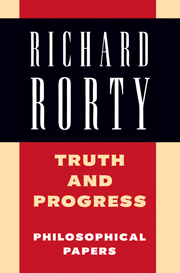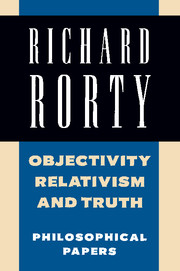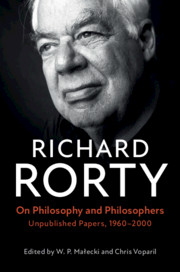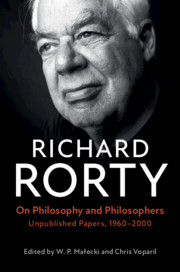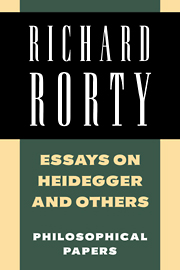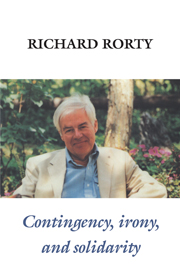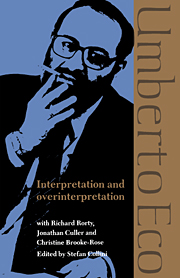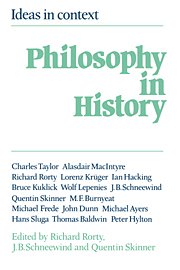Truth and Progress
This volume complements two highly successful previously published volumes of Richard Rorty's philosophical papers: Objectivity, Relativism, and Truth, and Essays on Heidegger and Others. The essays in the volume engage with the work of many of today's most innovative thinkers including Robert Brandom, Donald Davidson, Daniel Dennett, Jacques Derrida, Jürgen Habermas, John McDowell, Hilary Putnam, John Searle, and Charles Taylor. The collection also touches on problems in contemporary feminism raised by Annette Baier, Marilyn Frye, and Catherine MacKinnon, and considers issues connected with human rights and cultural differences. Anyone with a serious interest in contemporary philosophy and what it can do for us in the modern world will enjoy this invaluable collection.
- Main selling point is Rorty himself. His previous volumes have done tremendously well
- An international figure - Rorty's previous Cambridge books have been translated into French, German, Spanish, Italian, Portuguese, Danish, Dutch, Chinese, Russian, Japanese
- A major selling point of this new collection is that Rorty offers assessments of the views of some of the leading contemporary thinkers including: Hilary Putnam, John Searle, Charles Taylor, David Dennett, Juergen Habermas, and Jacques Derrida
Reviews & endorsements
"This is vintage Rorty; always so clear, provocative, unsettling, and cunningly profound!" Cornel West
"In Rorty's constantly stimulating essays from the past decade one can trace his cautious engagement with and then fastidious withdrawal from the semantic fields that Lyotard and company so thoroughly muddied. The whole postmodernism debate, he rightly implies, has become at best a waste of time, at worst a fraud: an incoherent attempt to build a new historical and cultural meta-narrative while denying the possibility of any such thing." New Statesman
"His books and articles read like a one-person international review of books: he collects fiction, history, and theory from around the world and marshalls it brilliantly according to the priorities of his anti-representationalist plot. However dense his discussions they retain a gratifying simplicity of outline. Rorty has created for himself the sort of cultural presence that once belonged to Mill, Russell, Ayer, or Joad. He is the only philosopher writing in English who has an enthusiastic non-specialist public, and like his predecessors, he offers the refreshing spectacle of cheeky sceptic who stands up to the obfuscators and shames them with his exemplary and readable prose. Rorty's new self is a brilliant old invention." The Times Higher Education Supplement
"Rorty's essays are nontechnical, historically informed, and philosophically provocative." Choice
"Rorty's fascinating presentation of recent intellectual history is impressive in its scope and penetration." Library Journal
"This volume is Rorty at his best, again and again making us see things from a new, unexpected angle, strenuously engaging with those of us who resist his startling and unsettling `take' on things. Convinced or not, you come away feeling that this is what philosophy ought to be doing, steadily extending the range of imaginable thoughts." Charles Taylor
"Few writers have done as much as Richard Rorty has to make contemporary philosophy interesting and important to people who are not philosophers. He has done this partly by a prose that is unmatched for clarity and vernacular vigor, but mostly by insisting on seeing what real social good we can make of the ideas available to us. His work is one of the finest models of intellectual engagement we have." Louis Menand
"Truth and Progress....can be recommended not only to Rorty's admirers and to those who regard him as a leading enemy of reason but to anyone who wants to get a sense of a signifigant intellectual phenomenon. Thomas Nagel, Times Literary Supplement
"Rorty is at his best when writing about the history of philosophy." Jenny Teichman, The New Criterion
"Truth and Progress is evidence of a revitalized American pragmatism that, in Rorty's version, celebrates ethnocentrism, cultural relativism, and human social experimentation.... Shaped by Darwinism, it is romantically resonant with the American quest for a better life , and even a better life economically, and it has an eye always on practical consequences." Dan Barnett, Magill's Literary Annual 1999
Product details
March 1998Paperback
9780521556866
364 pages
226 × 152 × 25 mm
0.54kg
Available
Table of Contents
- Introduction
- Part I. Truth and Some Philosophers:
- 1. Is truth a goal of inquiry?: Donald Davidson vs. Crispin Wright
- 2. Hilary Putnam and the relativist menace
- 3. John Searle on realism and relativism
- 4. Charles Taylor on truth
- 5. Daniel Dennett on intrinsicality
- 6. Robert Brandom on social practices and representations
- 7. The very idea of human answerability to the world: John McDowell's Version of Empiricism
- 8. Anti-sceptical weapons: Michael Williams vs. Donald Davidson
- Part II. Moral Progress: Towards more Inclusive Communities:
- 9. Human rights, rationality, and sentimentality
- 10. Rationality and cultural difference
- 11. Feminism and pragmatism
- 12. The end of Leninism, Havel and social hope
- Part III. The Role of Philosophy in Human Progress:
- 13. The historiography of philosophy: four genres
- 14. The contingency of philosophical problems: Michael Ayers on Locke
- 15. Dewey between Hegel and Darwin
- 16. Habermas, Derrida and the functions of philosophy
- 17. Derrida and the philosophical tradition.

